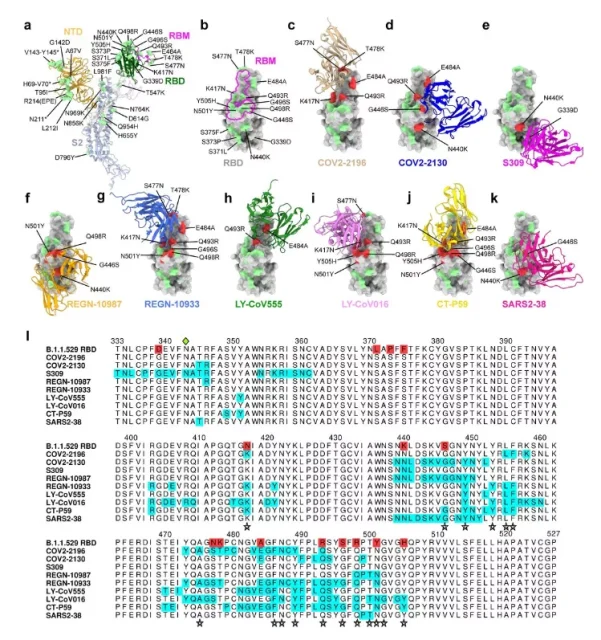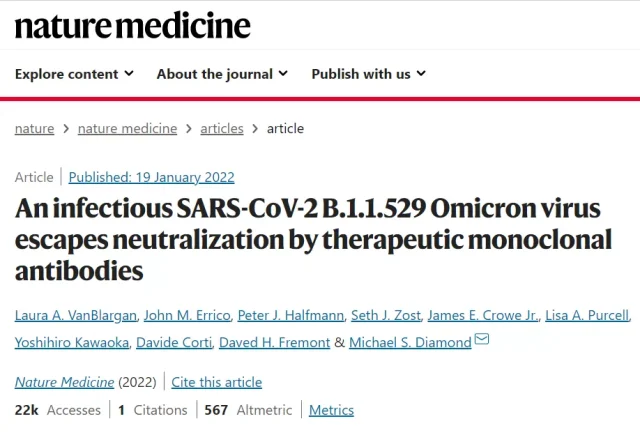Omicron mutant strains may evade some attacks from monoclonal antibodies!
- Statins Lower Blood Lipids: How Long is a Course?
- Warning: Smartwatch Blood Sugar Measurement Deemed Dangerous
- Mifepristone: A Safe and Effective Abortion Option Amidst Controversy
- Asbestos Detected in Buildings Damaged in Ukraine: Analyzed by Japanese Company
- New Ocrevus Subcutaneous Injection Therapy Shows Promising Results in Multiple Sclerosis Treatmen
- Dutch Man Infected with COVID-19 for 613 Days Dies: Accumulating Over 50 Virus Mutations
New discovery: Omicron mutant strains may evade some attacks from monoclonal antibodies!
- Red Yeast Rice Scare Grips Japan: Over 114 Hospitalized and 5 Deaths
- Long COVID Brain Fog: Blood-Brain Barrier Damage and Persistent Inflammation
- FDA has mandated a top-level black box warning for all marketed CAR-T therapies
- Can people with high blood pressure eat peanuts?
- What is the difference between dopamine and dobutamine?
- How long can the patient live after heart stent surgery?
New discovery: Omicron mutant strains may evade some attacks from monoclonal antibodies!
ImageDue to the number of mutations in the spike protein, the emergence of the highly transmissible B.1.1.529 omicron mutant of SARS-CoV-2 has caused scientists to have certain concerns about the efficacy of antibody therapy;
recently, an article published in International In a research report titled “An infectious SARS-CoV-2 B.1.1.529 Omicron virus escapes neutralization by therapeutic monoclonal antibodies” in the journal Nature Medicine.
Scientists from Washington University School of Medicine and other institutions have discovered through research that many (but not all) human monoclonal antibodies are clinically used to prevent patients from becoming seriously ill due to COVID-19, Perhaps there is no protection against invasion by the Omicron mutant.
 Neutralizing mAb epitopes on B.1.1.529.
Neutralizing mAb epitopes on B.1.1.529.
Image credit: DOI: 10.1038/s41591-021-01678-y
The researchers tested five combinatorial antibodies, including precursor antibodies discovered at Vanderbilt University Medical Center, which were then optimized by AstraZeneca before being authorized for emergency use in patients only last month.
The researchers found that antibodies used clinically by companies including Celltrion, Regeneron and Eli Lilly completely lost their ability to neutralize the Cron mutant in cell culture, while Van The neutralizing ability of the antibody discovered by the DePauw University researchers also declined, with an antibody developed by Vir Biotech being the least affected.
Omicron mutants evade recognition by several monoclonal antibodies used as therapies, says James Crowe Jr, MD prophylactic antibodies in pre-exposure prophylaxis (pre-exposure prophylaxis for COVID-19) retained substantial activity, albeit with reduced activity; this seems to be good news, as researchers now have at least one antibody drug available for each adaptation Symptoms, and help effectively prevent or treat patients.
Most monoclonal antibodies used to prevent severe disease in COVID-19 are administered intravenously, and Evusheld’s drug is currently the only antibody combination therapy that can be administered intramuscularly to protect uninfected people; currently Evusheld The drug is authorized only for people who are not infected with COVID-19, people who are immunocompromised due to medical conditions or diseases including cancer, or people who have a history of serious adverse reactions to COVID-19 vaccinations.
The researchers believe that the loss of antibody neutralization ability is due to more than 30 mutations in the spike protein of the mutant Omicron.
 Image source: https://www.nature.com/articles/s41591-021-01678-y
Image source: https://www.nature.com/articles/s41591-021-01678-y
The loss of inhibitory activity in the present study may be consistent with the investigators’ observation that antibody responses following vaccination or natural infection may also lose substantial inhibitory activity against the Omicron mutants.
The findings may partly explain the increase in symptomatic infections caused by the Omicron mutant in people who have been previously vaccinated against Covid-19.
Later researchers will also need to continue to identify and use broad-spectrum and potent neutralizing monoclonal antibodies that may target the most conserved and least mutated portions of the spike protein, thereby effectively protecting the body against Austrian Infection of Mikron mutants and subsequent damage.
Researchers have developed ultra-fast methods to discover and validate highly potent human antiviral monoclonal antibodies.
Taken together, the results of this study suggest that several, but not all, antibodies used in the clinic may lose their efficacy and potential against the B.1.1.529 Omicron mutant strain.
Original source:
VanBlargan, LA, Errico, JM, Halfmann, PJ et al. An infectious SARS-CoV-2 B.1.1.529 Omicron virus escapes neutralization by therapeutic monoclonal antibodies. Nat Med (2022). doi: 10.1038/s41591-021-01678 -y
New discovery: Omicron mutant strains may evade some attacks from monoclonal antibodies!
(source:internet, reference only)
Disclaimer of medicaltrend.org
Important Note: The information provided is for informational purposes only and should not be considered as medical advice.



